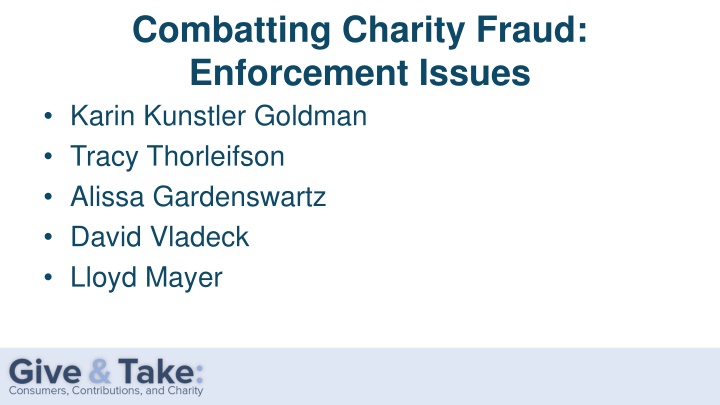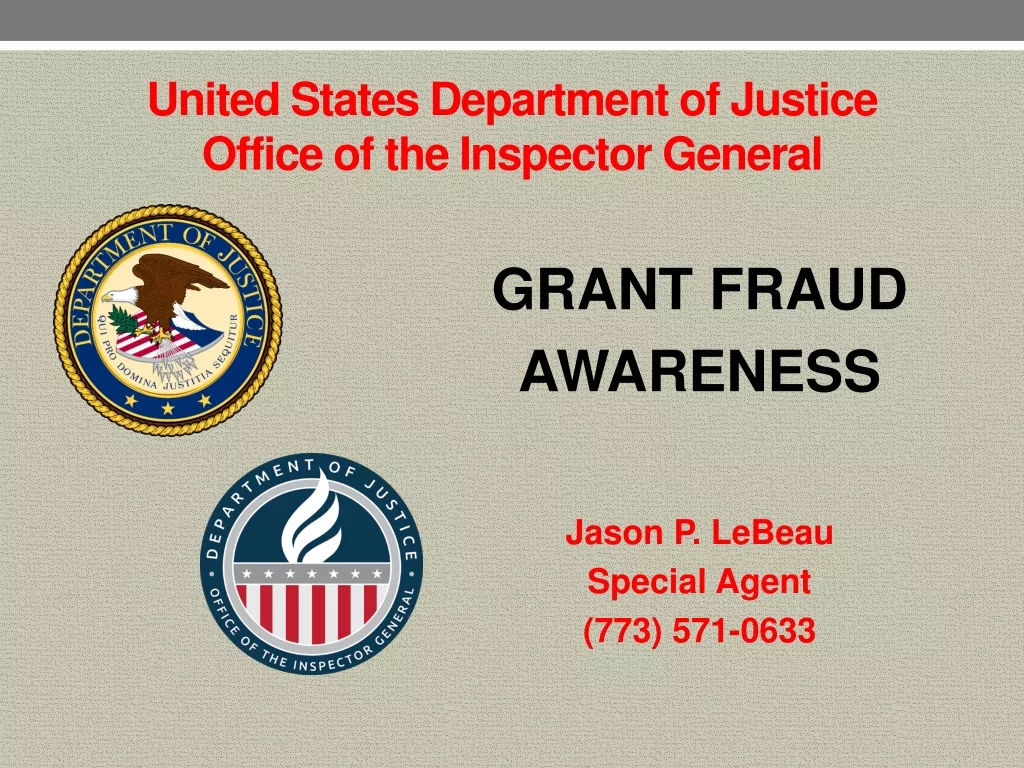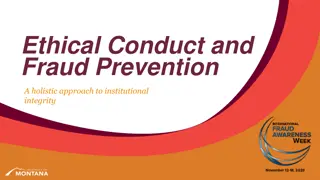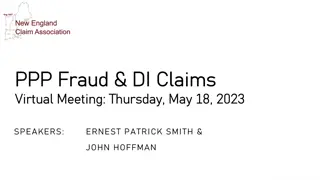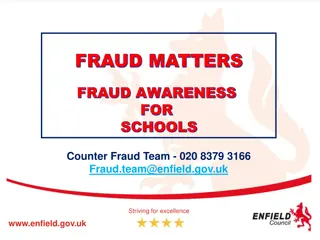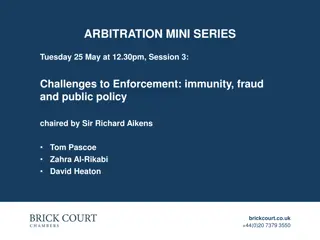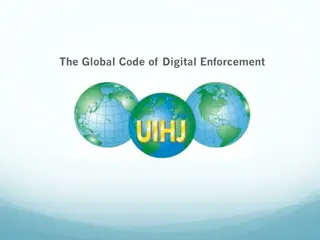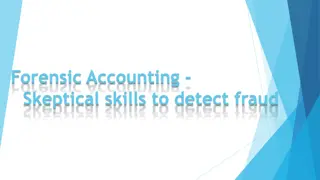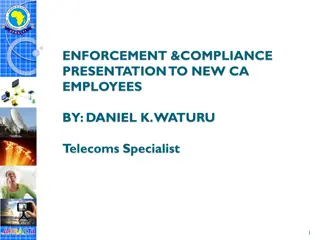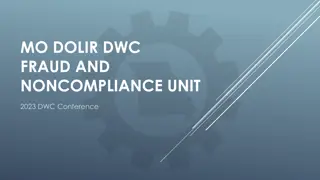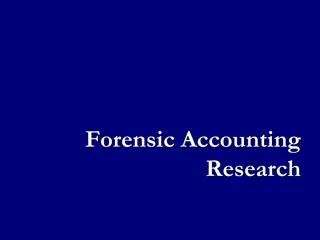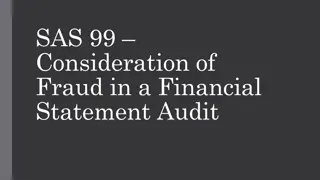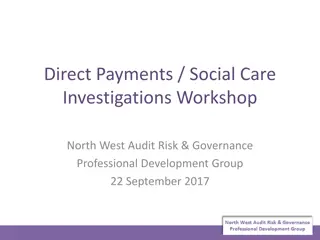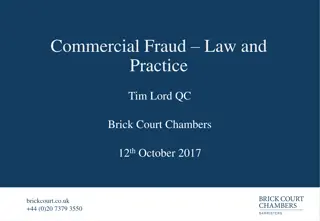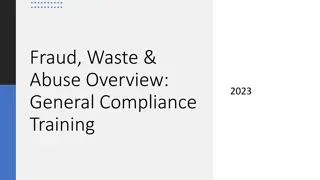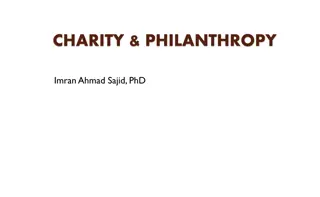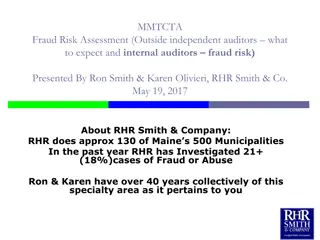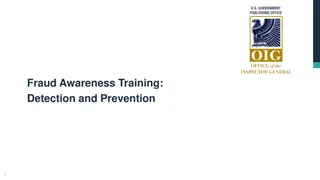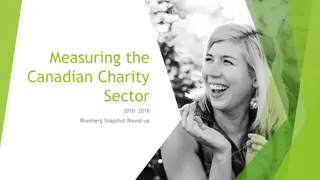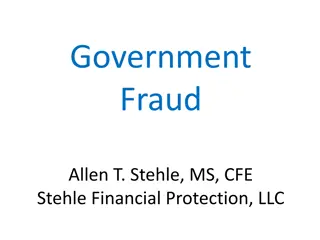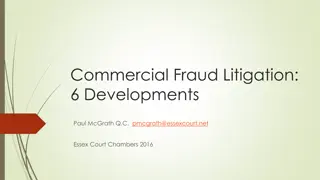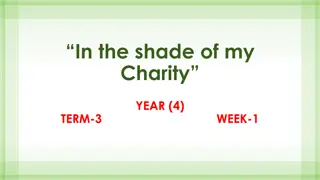Strategies for Combatting Charity Fraud: Insights and Enforcement Approaches
Explore key enforcement issues in combating charity fraud, including areas of authority, common enforcement focuses, fundraising methods regulated, enforcement approaches, and inter-office cooperation. Gain insights into regulatory efforts to protect consumers and charitable contributions.
Download Presentation

Please find below an Image/Link to download the presentation.
The content on the website is provided AS IS for your information and personal use only. It may not be sold, licensed, or shared on other websites without obtaining consent from the author.If you encounter any issues during the download, it is possible that the publisher has removed the file from their server.
You are allowed to download the files provided on this website for personal or commercial use, subject to the condition that they are used lawfully. All files are the property of their respective owners.
The content on the website is provided AS IS for your information and personal use only. It may not be sold, licensed, or shared on other websites without obtaining consent from the author.
E N D
Presentation Transcript
Combatting Charity Fraud: Enforcement Issues Karin Kunstler Goldman Tracy Thorleifson Alissa Gardenswartz David Vladeck Lloyd Mayer
GIVE & TAKE: CONSUMERS, CONTRIBUTIONS, AND CHARITY GIVE & TAKE: CONSUMERS, CONTRIBUTIONS, AND CHARITY A Conference Exploring Consumer Protection Issues Associated with A Conference Exploring Consumer Protection Issues Associated with Charitable Solicitations Charitable Solicitations March 21, 2017
Areas of authority Solicitation Criminal Registration State Charity Regulators AG offices and other state offices Board Governance Registration Compliance Conservation Easements Wills/Trusts Transaction Review AG only Other state regulator only AG and other state regulator 11
Most common areas of enforcement Percent of offices* 0% 10% 20% 30% 40% 50% 60% 70% Fundraising abuses 62% Governance 36% Trust enforcement 36% Other 23% Diversion/fraud 21% Registration 21% Conservation easements 3% *39 offices interviewed 21
Fundraising methods regulated by offices Percent of offices 60% 65% 70% 75% 80% 85% Telephone 82% Direct mail 80% In person 80% Special events 80% Internet 76% Social media 70% 22
Approaches to enforcement Percent of offices 0% 10% 20% 30% 40% 50% 60% 70% 80% 90% 100% Correspondence with organization Obtain settlement agreement Obtain informal resolution Impose fines/penalties Seek legal injunction Send delinquency notices Revoke/terminate/cancel registration Enter into letter agreements Obtain court order to dissolve charity Tracking of enforcement actions in-state Conduct administrative proceedings Tracking of enforcement actions elsewhere 98% 88% 85% 80% 79% 74% 58% 54% 53% 49% 44% 31% 23
Inter-office cooperation Refers matters Joint actions 100% 84% 81% 80% 74% 73% 73% 70% Percent of offices 68% 65% 63% 60% 40% 20% N/A 0% Local law enforcement Another state-level law enforcement office Other states' enforcement offices Federal law enforcement office IRS 24
Combatting Charity Fraud: The Role of the Federal Trade Commission Tracy S. Thorleifson Attorney, Northwest Region. Federal Trade Commission The views expressed are my own and do not reflect the opinion of the Commission or any individual Commissioner.
The FTC Act Section 5 empowers the Commission to: prevent persons, partnerships, or corporations . . . from using . . . unfair or deceptive acts or practices in or affecting commerce. 15 U.S.C. 45. Section 4 defines Corporation to include. . . any company, trust, so-called Massachusetts trust, or association, incorporated or unincorporated, without shares of capital or capital stock or certificates of interest, except partnerships, which is organized to carry on business for its own profit or that of its members. 15 U.S.C. 44
The Telemarketing Sales Rule Jurisdiction co-extensive with FTC Act Telemarketing = a plan, program, or campaign . . . to induce the purchase of goods or services or a charitable contribution involving more than one interstate telephone call Prohibits false and misleading charitable solicitations
Telemarketing Sales Rule (cont.) For profit fundraisers must comply with the entity-specific Do Not Call requirements, but are exempt from the National Do Not Call Registry provision. Other calling restrictions also apply. State attorneys general may bring actions to enforce the TSR in federal court.
FTC, All 50 States and D.C. v. Cancer Fund of America, et al. First collective action by the FTC, 50 states and D.C. against a purported charity Sued 4 charities and related individuals that: raised more than $187 million from U.S. consumers over 5 years Lied about how donations would be used, promising: Pain medication for suffering children with cancer Hospice care for indigent cancer patients Medical equipment to needy cancer patients
Cancer Fund (cont.) Donations spent on family, friends, and fundraisers. Cruises and Disney World trips for board members Jet ski rentals, meals at Hooters, and purchases at Victoria s Secret on charity credit cards Employed all family members, regardless of qualifications, paid tuition for and made loans to family and friends Collectively spent less than 3% of funds on programs described to donors
Cancer Fund (cont.) Complaint alleged deceptive practices that violated FTC Act and laws of all 50 states, plus violations of the Telemarketing Sales Rule Settlements banned the responsible individuals from charitable solicitations and from oversight of charitable funds Charities are now in receivership, their assets have been liquidated and their existence dissolved.
Other FTC Enforcement Enforcement & Education Sweeps: Operation False Alarm (March 1997) (with 50 states) Operation Missed Giving (November 1998) (with 40 states) Operation Phoney Philanthropy (May 2003)(with 34 states) Operation False Charity (May 2009)(with 49 states)
Other FTC Enforcement Actions against for-profit fundraisers violating Section 5 and/or the TSR, e.g.: U.S. v. Civic Development Group U.S. v. JAK Publications Actions against for profit companies claiming a charitable benefit associated with the sale of goods or services, e.g.: FTC v. American Handicapped and Disadvantaged Workers, Inc.
On the horizon . The FTC will combat charity fraud by: Continuing to collaborate with state partners Bringing enforcement actions against for profit fundraisers and sham charities that lie to consumers and misuse money intended to support charitable causes, when possible and appropriate Educating consumers by providing them tools to avoid charity fraud and achieve their charitable purposes
COLORADO OFFICEOFTHE ATTORNEY GENERAL CONSUMER PROTECTION SECTION Alissa Gardenswartz Deputy Attorney General
COLORADO OFFICEOFTHE ATTORNEY GENERAL CONSUMER PROTECTION SECTION Solicitation Fraud Actions Fall Into One of Three Categories: Action Taken Against Charity Action Taken Against Paid Solicitor Action Taken Against Both
COLORADO OFFICEOFTHE ATTORNEY GENERAL CONSUMER PROTECTION SECTION VietNow VietNow MI MI Used two paid solicitors (Corporations for Character and Courtesy Call) Charity approved misrepresentations in solicitation scripts Misrepresented local benefit (12% after expenses to MI Vets) Misrepresented that money went to medical facilities and treatment Noted de minimus amount given to charitable programs as support for fraud claims
COLORADO OFFICEOFTHE ATTORNEY GENERAL CONSUMER PROTECTION SECTION National Vietnam Veterans Foundation/American Veteran Support Foundation National Vietnam Veterans Foundation/American Veteran Support Foundation NY NY Majority of funds went to professional fundraisers Fraction that went to NVVF reduced by pattern of abuse and mismanagement False and inaccurate registration filings
COLORADO OFFICEOFTHE ATTORNEY GENERAL CONSUMER PROTECTION SECTION Florida Veteran s Assistance Corp. and VFW Corp., Florida Veteran s Assistance Corp. and VFW- -VA Assistance Programs Corp., FL VA Assistance Programs FL Suggested association with VFW and VA in solicitations Used unregistered paid solicitors Both charity and solicitors pretended to be U.S. Military, promised specific benefits to veterans that were never provided Misrepresented tax deductibility Submitted false information in registrations
COLORADO OFFICEOFTHE ATTORNEY GENERAL CONSUMER PROTECTION SECTION Breast Cancer Outreach Foundation Breast Cancer Outreach Foundation - - MI MI Used several paid solicitors All scripts represented that BCOF was raising money for breast cancer research/finding a vaccine for breast cancer Only $8,235 of $1.4 M raised nationwide went to a grant Money raised was used to pay for gift-in-kind ( GIK ) program Improper use of SOP 98-2 and GIK program basis for making false statements to the AG
COLORADO OFFICEOFTHE ATTORNEY GENERAL CONSUMER PROTECTION SECTION Associated Community Services, Inc. and Central Processing Services, LLC Associated Community Services, Inc. and Central Processing Services, LLC- - MN MN Arose out of solicitations for Foundation for American Veterans, Inc. Numerous prior actions, including MI in 2016 Several issues: Falsely representing donors had made a pledge Falsely representing that the caller was from FAV Failure to make statutorily-required disclosures
COLORADO OFFICEOFTHE ATTORNEY GENERAL CONSUMER PROTECTION SECTION Corporations for Character Corporations for Character - - MI MI Soliciting for Michigan Fraternal Order of Police Several variations on pledge-related misrepresentations Did not pledge, but sent form stating pledge had been promised Did not pledge, but sent form implying specific pledge was made Did pledge, but form was addressed to non-pledging spouse stating he or she had pledged Took advantage of caller s clear inability to understand and consent to a pledge
COLORADO OFFICEOFTHE ATTORNEY GENERAL CONSUMER PROTECTION SECTION Quadriga Direct mail operation formed relationship with start-up charity Funded model direct mail company paid for costs of campaign, paid out of campaign revenues, has control over revenues and a lien on donor list Mailings replete with misrepresentations Multiple conflicts of interest among charity and fundraising professionals Questionable GIK program Quadriga Art/Disabled Veterans National Foundation Art/Disabled Veterans National Foundation - -NY NY
COLORADO OFFICEOFTHE ATTORNEY GENERAL CONSUMER PROTECTION SECTION Enforcement focus still on traditional fundraising models Enforcement focus still on traditional fundraising models Choices in who Choices in who to enforce against to enforce against High fundraising costs as evidence of fraud High fundraising costs as evidence of fraud
COLORADO OFFICEOFTHE ATTORNEY GENERAL CONSUMER PROTECTION SECTION Alissa Gardenswartz Deputy Attorney General
The Legal Challenges Posed by Social Media Viral Campaigns, Crowdfunding, and Hybrid Entities March 21, 2017 Lloyd Hitoshi Mayer Professor of Law University of Notre Dame
Social Media Viral Campaigns Notable Successes: ALS Ice Bucket Challenge ($115M in 8 weeks) Movember ($710M since 2003) Notable Scandals: none Open Questions Do (or should) charitable solicitation or consumer protection laws apply to individuals who solicit contributions for charities through social media? Do (or should) such laws apply to social media sites used to promote viral campaigns? ALS Association
Crowdfunding Equality Florida Institute, Inc. Notable Success: Equality Florida in wake of Orlando shooting ($9 million on GoFundMe) Notable Scandals: Boston Marathon Bombing scammer ($9,350 on GoFundMe) Open Questions Do (or should) charitable solicitation or consumer protection laws apply to individuals who crowdfund for charities or charitable purposes? Do (or should) such laws reach the operators of crowdfunding sites used by such crowdfunders?
Hybrid Entities Patagonia Notable Success: Patagonia, Kickstarter Notable Scandals: none Open Questions If a hybrid entity utilizes its social benefitting mission to attract customers, do (or should) charitable solicitation or consumer protection laws apply to that entity s representations? Do (or should) such laws apply to social enterprises more generally that is, even if they are not organized as a hybrid entity?
The Legal Challenges Posed by Social Media Viral Campaigns, Crowdfunding, and Hybrid Entities March 21, 2017 Lloyd Hitoshi Mayer Professor of Law University of Notre Dame
